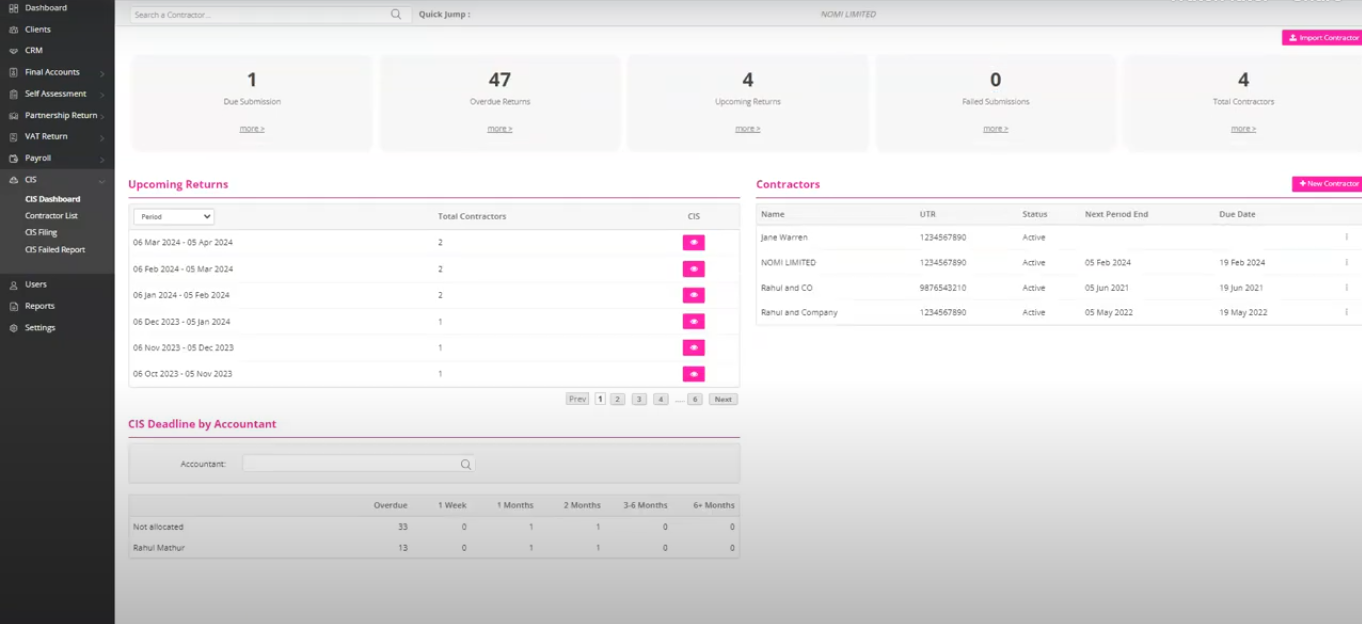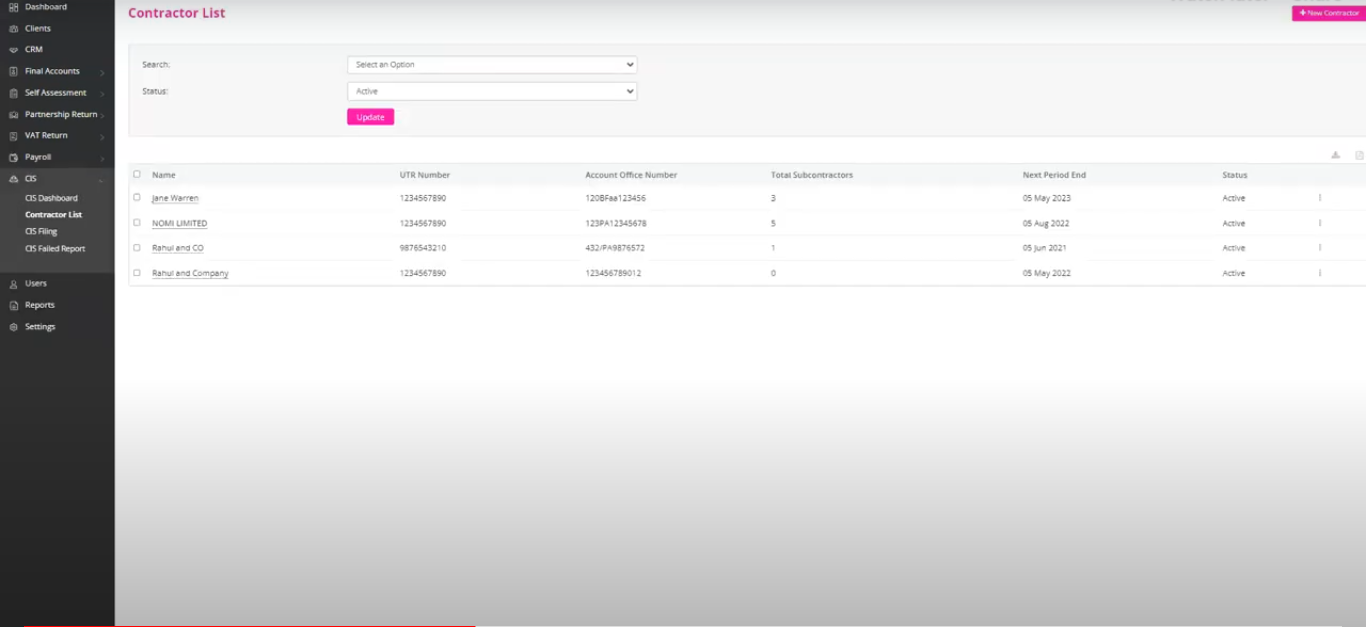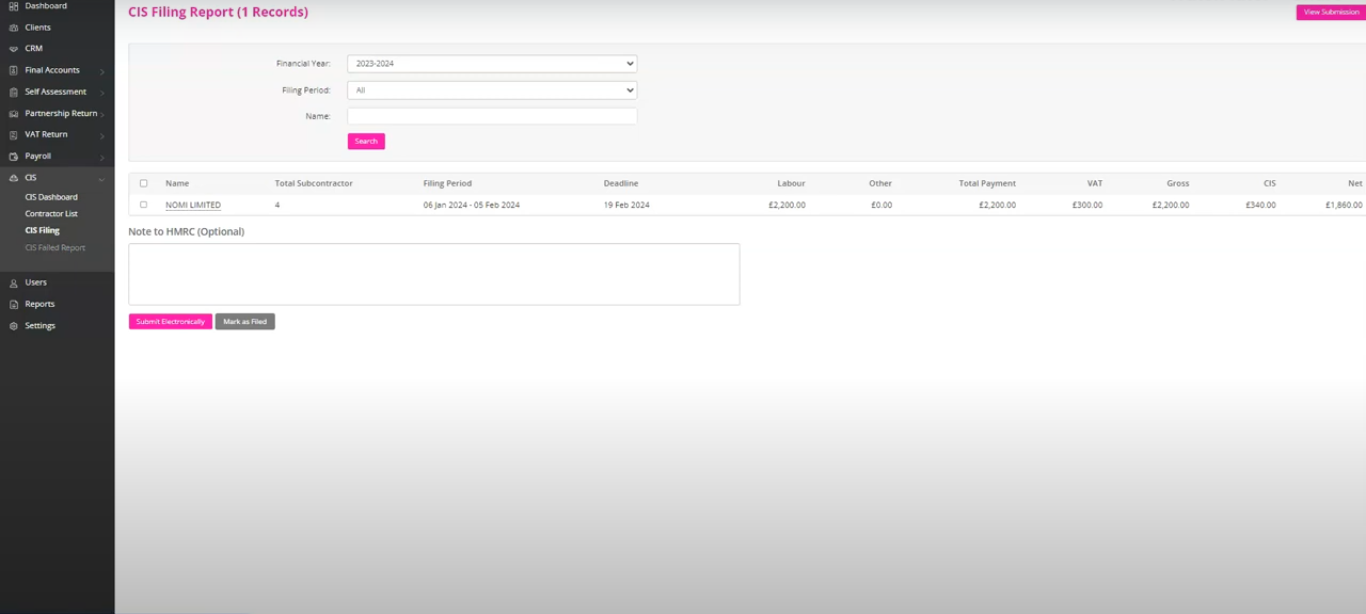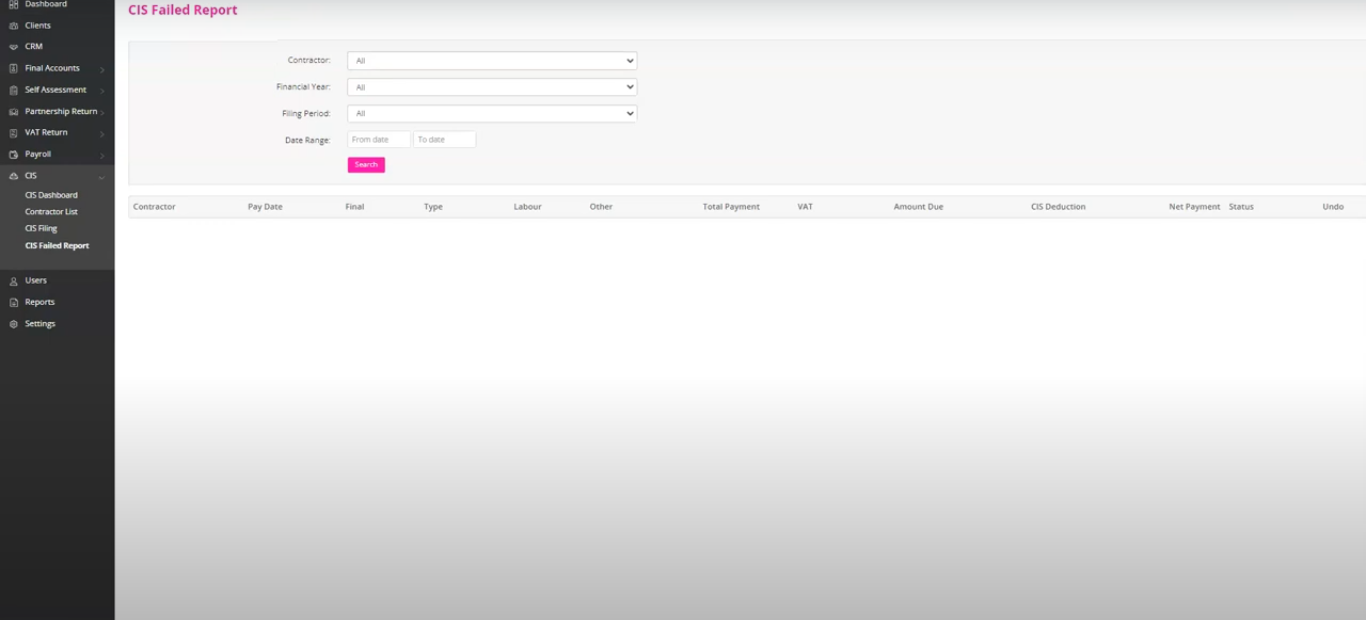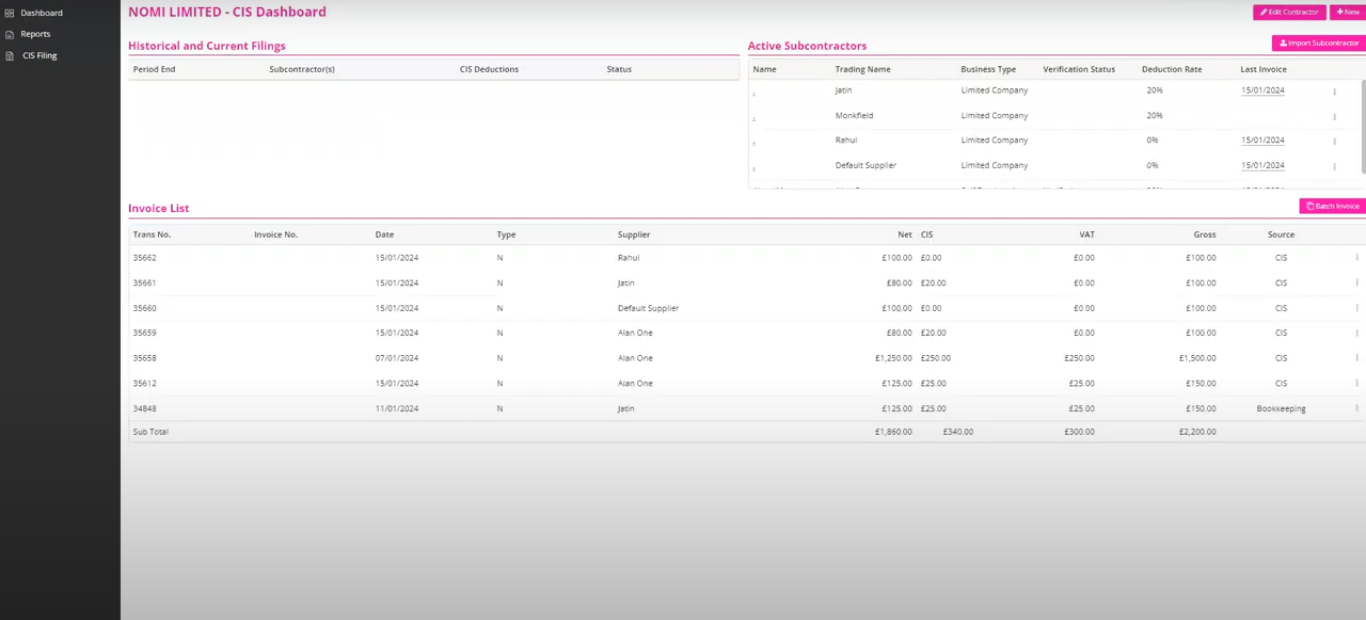CIS Software for Construction Industry Scheme Management

CIS, or the Construction Industry Scheme, is a tax deduction scheme designed for contractors and subcontractors in the construction industry. Managing CIS obligations can be challenging, particularly when verifying subcontractor information, tracking invoices, and submitting deductions to HMRC. CIS software simplifies these tasks by offering a centralised platform that streamlines subcontractor verification, invoice management, and CIS deductions.
With CIS software, contractors can easily generate important documents like payslips and certificates, ensuring compliance with HMRC regulations. The platform also enables straightforward submission of CIS returns, saving time and minimising errors. Ultimately, CIS software allows contractors to concentrate on their primary business activities while effectively managing their CIS responsibilities.
Features of CIS Software
CIS software offers a variety of essential features that make managing construction industry obligations easier and more efficient. Here are some key features:
- Subcontractor Verification Management: Easily submit and track subcontractor verification requests, ensuring all necessary documentation is in place before work begins.
- Invoice Tracking: Keep an organised record of all subcontractor invoices, allowing for quick access and review, which helps maintain accurate financial records.
- CIS Deductions Management: Automatically calculate and track CIS deductions from subcontractor payments, ensuring compliance with HMRC regulations.
- Payslip Generation: Effortlessly generate subcontractor payslips that detail earnings and deductions, providing transparency and clarity for all parties involved.
- Certificate Creation: Quickly create CIS certificates for subcontractors, ensuring they have the necessary documentation for their tax records.
- Integration with Payroll: Link CIS deductions directly to your payroll system, simplifying the process of offsetting deductions against PAYE due.
- HMRC Submission: Submit CIS returns directly to HMRC from the platform, reducing paperwork and minimising the risk of errors.
These features collectively enhance efficiency, improve compliance, and help contractors focus on growing their businesses.
Subcontractor Verification Management
Subcontractor verification management is an important aspect of the Construction Industry Scheme (CIS) that ensures all subcontractors are compliant with tax regulations. This process involves confirming subcontractors’ identity and tax status before they begin work. CIS software makes this task easy by allowing contractors to submit verification requests online.
When contractors need to verify a subcontractor, they can quickly enter the subcontractor’s details into the software. The system then communicates with HMRC to check the subcontractor’s tax status and eligibility. This instant verification helps prevent any potential issues related to tax deductions later.
Additionally, the software records all verification requests and their outcomes, making it easy to track compliance over time. By managing subcontractor verification efficiently, contractors can avoid costly penalties and ensure they meet their legal obligations. This protects the contractor’s business and fosters trust and transparency in the working relationship with subcontractors.
Invoice and Deduction Tracking
Invoice and deduction tracking is a vital feature of CIS software that helps contractors manage their financial obligations effectively. This process involves keeping detailed records of all subcontractor invoices and the corresponding CIS deductions taken from their payments.
With CIS software, contractors can easily input and categorise each subcontractor’s invoice, ensuring that all financial transactions are organised and accessible. The software automatically calculates the appropriate CIS deductions based on the subcontractor’s tax status, reducing the risk of errors and ensuring compliance with HMRC regulations.
Moreover, the software provides a clear overview of all invoices and deductions, allowing contractors to monitor outstanding payments and track cash flow. This visibility helps in making informed financial decisions and planning for future expenses.
By efficiently managing invoice and deduction tracking, contractors can save time on administrative tasks, reduce the risk of disputes with subcontractors, and maintain accurate financial records. This enhances operational efficiency and supports better relationships with subcontractors, fostering a more transparent and trustworthy working environment.
Payslip and Certificate Generation
CIS software makes it easy to generate payslips and certificates for subcontractors. Payslips are essential documents that detail a subcontractor’s earnings and the corresponding CIS deductions made by the contractor. Using CIS software, contractors can quickly generate CIS payslips that clearly communicate this information to subcontractors.
Additionally, the software enables the creation of CIS certificates, which are necessary for subcontractors to claim back any overpaid tax from HMRC. These certificates outline the total amount of CIS deductions made throughout the tax year, making it easier for subcontractors to file their tax returns accurately.
By automating the generation of payslips and certificates, CIS software saves contractors valuable time and reduces the risk of errors. This feature ensures subcontractors receive the necessary documentation to manage their tax affairs efficiently, fostering positive working relationships and compliance with HMRC regulations.
CIS Deduction Integration with Payroll
CIS deduction integration with payroll is a key feature of CIS software that simplifies the management of tax deductions for subcontractors. This integration allows contractors to automatically link CIS deductions to their payroll system, ensuring that all tax obligations are calculated accurately and efficiently.
The software automatically applies the correct CIS deductions when processing payroll based on each subcontractor’s tax status. This eliminates the need for manual calculations, reduces the risk of errors, and ensures compliance with HMRC regulations.
Additionally, this integration provides a clear overview of all deductions taken, making it easier for contractors to track their financial responsibilities.
By managing CIS deductions directly within the payroll system, contractors can save time, increase accuracy, and maintain organised records. This feature supports efficient financial management and helps build trust with subcontractors by ensuring transparency in payment processes.
CIS Return Submission to HMRC
CIS software makes submitting CIS returns to HMRC easy by allowing contractors to do so directly from the platform. This feature eliminates the need for manual paperwork and reduces the risk of errors or delays in the submission process
Contractors can easily generate their CIS returns based on the data collected throughout the year, including subcontractor details, invoices, and deductions. The software then provides a secure and efficient method for submitting these returns to HMRC, ensuring that all obligations are met on time.
By simplifying the CIS return submission process, contractors can save valuable time and resources while maintaining compliance with HMRC regulations. This feature helps contractors stay organised, avoid penalties, and focus on confidently growing their business.
Benefits of Using CIS Software
Using CIS software offers numerous advantages for contractors in the construction industry. Here are some key benefits:
- Improved Efficiency: CIS software automates many time-consuming tasks, such as verification of subcontractor invoices. This allows contractors to focus on their core business activities instead of getting bogged down in administrative work.
- Accurate Record-Keeping: The software maintains organised records of all transactions, including invoices, deductions, and submissions. This accuracy reduces the risk of errors and ensures that all financial data is easily accessible when needed.
- Improved Compliance: CIS software helps contractors comply with HMRC regulations by automatically calculating the correct CIS deductions and generating the necessary documentation. This minimises the risk of penalties due to non-compliance.
- Easy Tax Management: Features like automatic deduction calculations and easy generation of CIS returns help contractors manage their tax obligations more effectively. This simplifies the often complex tax processes associated with subcontractor payments.
- Better Financial Control: The software provides a clear overview of all financial transactions, including outstanding invoices and deductions. This visibility helps contractors manage cash flow and make informed financial decisions.
- Time Savings: CIS software saves contractors significant time by automating repetitive tasks and providing easy access to important documents. This allows them to allocate resources more effectively and focus on growing their business.
- Improved Communication: CIS software often includes features facilitating communication with subcontractors, such as automated payslips and certificate generation. This fosters transparency and trust in contractor-subcontractor relationships.
- Scalability: As a business grows, CIS software can easily adapt to increased workloads and more complex financial management needs, ensuring that contractors can continue to operate efficiently.
In summary, using CIS software improves efficiency, accuracy, compliance, and financial control, making it an invaluable tool for contractors in the construction industry.
Organised Record-Keeping
Organised record-keeping is an important benefit of using CIS software. It provides contractors with a systematic approach to managing their financial documents and compliance obligations. CIS software stores all records related to subcontractors, invoices, and deductions in a centralised digital platform. This eliminates the chaos of paper files and scattered spreadsheets, making it easy to locate any document when needed.
The software automatically categorises and updates records in real-time, ensuring that all information is current and accurate. For instance, when a subcontractor submits an invoice, it can be quickly entered into the system, and the corresponding CIS deductions are calculated and recorded without delay. This level of organisation improves accuracy and reduces the risk of errors that can arise from manual data entry.
Additionally, having well-organised records simplifies preparing for audits or HMRC inspections. Contractors can easily access the necessary documentation, such as payslips, certificates, and tax returns, without the stress of searching through paperwork. This organised approach fosters transparency and accountability, which are essential for maintaining good relationships with subcontractors and regulatory bodies.
Ultimately, organised record-keeping through CIS software saves time, reduces stress, and improves compliance. It allows contractors to focus on their core business activities while ensuring that all financial obligations are met efficiently. This not only supports operational efficiency but also contributes to the overall success and growth of the business.
Compliance with HMRC Regulations
Compliance with HMRC regulations is a critical aspect of managing subcontractor payments in the construction industry, and CIS software plays a vital role in ensuring this compliance. The software automatically calculates the correct CIS deductions based on the subcontractor’s tax status, minimising the risk of errors that could lead to penalties.
Additionally, CIS software generates the necessary documentation, such as payslips and CIS certificates, which are essential for both contractors and subcontractors to maintain accurate tax records. This ensures all parties have the correct information when filing their tax returns.
When it comes time to submit CIS returns, the software facilitates direct submission to HMRC, reducing the complexity of the process and ensuring that deadlines are met. By providing accurate calculations, organised records, and timely submissions, CIS software helps contractors confidently navigate the regulatory landscape, ultimately fostering a compliant and trustworthy business environment.
Efficient Management of CIS Obligations
Efficient management of CIS obligations is essential for contractors in the construction industry, and CIS software significantly enhances this process. By automating key tasks, such as subcontractor verification and deduction calculations, the software reduces the time and effort required to manage these responsibilities.
Contractors can easily track all invoices and deductions in one centralised platform, ensuring nothing is overlooked. This organised approach helps maintain compliance with HMRC regulations and minimises the risk of errors that could lead to penalties.
Moreover, CIS software makes it easy to generate necessary documentation, such as payslips and CIS returns, allowing timely submissions to HMRC.
By effectively managing CIS obligations, contractors can focus on their core business activities, reduce administrative burdens, and foster positive relationships with subcontractors, ultimately contributing to overall business success.
Choosing the Right CIS Software
Choosing the right CIS software is important for contractors to efficiently manage their construction industry responsibilities. When assessing options, focus on features that meet your needs, like subcontractor verification, invoice tracking, and automated deduction calculations to streamline your processes and ensure compliance.
Nomi software offers a user-friendly interface that simplifies these processes, making it easy to navigate and manage your CIS responsibilities. Additionally, it integrates seamlessly with existing systems like payroll and accounting, ensuring a smooth workflow.
With robust customer support and regular updates to keep you compliant with changing regulations, our software is designed to grow with your business. By selecting our CIS software, you can improve your operational efficiency and focus on what truly matters—growing your business and maintaining strong relationships with subcontractors.
Overlook of Nomi’s CIS software
Dashboard
The dashboard screen displays all the important information such as no of due submissions, overdue returns, upcoming returns, failed submissions and total contractors. It also shows detailed data on `upcoming reports’, `contractors’ and `CIS Deadline by Accountant’
Contractor List
This is the screen of the contractor list through which you can navigate each contractor’s dashboard.
CIS Filing
In CIS filing, you can check returns that are ready for filing.
CIS Failed Report
You can check files that failed before submission through the CIS Failed Report screen.
CIS Contractor Dashboard
CIS Contractor Dashboard displays data regarding `Current & Historical filing’, `Active Subcontractors’ and `Invoice List’.
To watch a detailed demo of Nomi’s CIS software, Click here: https://youtu.be/YZ4ggub2qGI
If you have questions about CIS software or need more information, we’re here to help! Whether you’re an accountant or a bookkeeper looking for an expert solution to manage your CIS obligations, Our CIS software is designed to meet your needs. With features that simplify subcontractor verification, invoice tracking, and deduction calculations, our software can improve your efficiency and compliance.
We offer a free trial package to help you get a feel for its capabilities, allowing you to explore all the functionalities and benefits firsthand. Book a demo, experience the difference with Nomi today, and see how our software can effectively support your business in managing CIS responsibilities!
Want to find out more?
Book a free 30-day trial or talk to one of our advisor and see how our accounting software can help you manage staff, increase profitability and take your practice to the next level.

Be Audit-Ready: What HMRC Wants to See in Your Corporation Tax Records
Keeping accurate financial records has always been an important part of running a compliant limited...
Read More

Onboarding That Wins Clients: A Smarter Start For Accountants
Client onboarding is about more than just ticking admin boxes. A smooth, professional client onboarding...
Read More

Making Tax Digital: A Self-Employed Guide to ITSA Changes’?
If you’re self-employed, a sole trader or run a small business, you’ve probably heard about...
Read More

Introducing OpenTax for Nomi’s Accountants
Managing client tax submissions and payments can be a time-consuming challenge for accountants. OpenTax simplifies...
Read More
